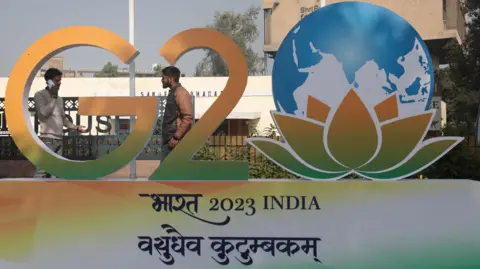“This shows how vested interests of powerful countries can influence decisions,” an economist who didn’t want to speak on the record told the BBC.
Addressing this imbalance was a key proposal in the reforms mooted for the IMF and other multilateral lenders during India’s G20 presidency in 2023.
In their report, former Indian bureaucrat NK Singh and former US treasury secretary Lawrence Summers recommended breaking the link between IMF voting rights and financial contributions to ensure fairer representation for both the “Global North” and the “Global South”. But there has been no progress so far on implementing these recommendations.
Furthermore, recent changes in the IMF’s own rules about funding countries in conflict add more complexity to the issue. A $15.6bn loan by the fund to Ukraine in 2023 was the first of its kind by the IMF to a country at war.
“It bent its own rules to give an enormous lending package to Ukraine – which means it cannot use that excuse to shut down an already-arranged loan to Pakistan,” Mihir Sharma of the Observer Research Foundation (ORF) think tank in Delhi told the BBC.

If India really wants to address its grievances, the right forum to present them would be the United Nations FATF (Financial Action Task Force), says Mr Haqqani.
The FATF looks at issues of combating terror finance and decides whether countries need to be placed on grey or black lists that prevent them from accessing funds from bodies like the IMF or the World Bank.
“Grandstanding at the IMF cannot and did not work,” said Mr Haqqani. “If a country is on that [FATF] list it will then face challenges in getting a loan from the IMF – as has happened with Pakistan earlier.”
As things stand though, Pakistan was officially removed from the Financial Action Task Force (FATF) grey list in 2022.
Separately, experts also caution that India’s calls to overhaul the IMF’s funding processes and veto powers could be a double-edged sword.
Such reforms “would inevitably give Beijing [rather than Delhi] more power”, said Mr Sharma.
Mr Haqqani agrees. India should be wary of using “bilateral disputes at multilateral fora”, he said, adding that India has historically been at the receiving end of being vetoed out by China in such places.
He points to instances of Beijing blocking ADB (Asian Development Bank) loans sought by India for the north-eastern state of Arunachal Pradesh, citing border disputes between the two countries in the region.